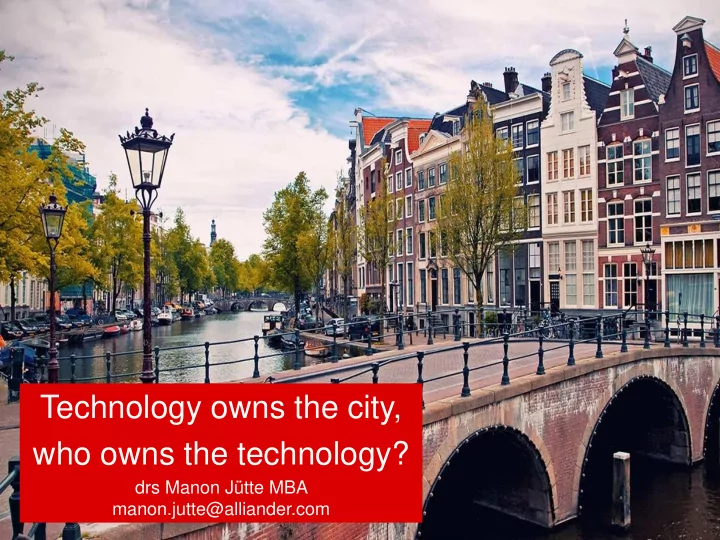

Technology owns the city, who owns the technology? drs Manon Jütte MBA manon.jutte@alliander.com 1
We live in a rapidly changing world World in 1926 World in 2050? 2
Cities are changing in Smart Cities • Self organizing communities • Open Data • Sharing Economy • Encouragement of self initiatives • Knowledge Economy • Connectivity • Internet of Things • Security • Sensoring • Healthcare • Energy • Water • eMobility • Waste disposal • Public • Sustainability Transportation Physical and digital infrastructures merge 3
For example: Amsterdam Smart City Amsterdam • 4th Port in Europe • 4th Airport in Europe • 1st Internet Exchange • 120.000 Students • 182 Nationalities • 2016: innovation capital Europe Amsterdam Smart City - liveable sustainable economic city • urban innovation platform • challenging businesses, residents, the municipality and knowledge institutions • test innovative ideas & solutions for urban issues. +100 Smart City projects 4
But what is a Smart City? • Concept Smart is broad and can mean anything. • Smart refers often to a new type of technology • It should refer to make cities a better place to live, more sustainable, better air quality, socially attractive and secure. • Energy and digitalisation play an important part of the change cities are going through 5
Which values prevail when developing technologies that shape the future? 6
A scenario… CHINESE MANUFACTURER US MANUFACTURER 7
Newspaper: conflict China and USA (not a real case!) 8
You walk to your car …. Your car is not loaded and the battery is empty… Is this due to a operational issue or to the Chinese and US conflict? You are in shock, are you really the victim of an international conflict? You wonder: shouldn’t your car and energy be independent of the interests of other parties? 9
Voorbeeld 1: uber 10
11
12
What about the other decentralised intelligent systems? 13
Your focus for Democracy by Design Inclusivity: Freedom of Equal treatment: choice: division of roles, sharing of costs autonomy transparency and minimisation and impact decision making of complexity of choices process 14
Smart Cities need an IoT trust-framework 15
Key components of IoT Trust Frameworks Monitoring, control & Ownership and reuse of tracebility information and data Security & privacy by Reliability & Independent design Open and inclusive Validation, Identification & governance Authorisation 16
Case Study – Sharing Sensors Different public and private partners own sensors(air pollution, camera’s, traffic flows etc.) in a city which can provide useful data for multiple actors. By reusing data from these sensors more value can be created, but also superfluous investments can be prevented, eg: multiple organisation have similar sensors in the same geographic areas. Access rights. Who has access Who checks compliancy? under what conditions? Can owner trust his personal Can owners check if no data is data are used anonomous. stored without permission? Other use cases: lamppost, camera for cctv, air quality from private parties/civilians, traffic sensor, etc. In fact: all sensors! 17
Towards Open Urban Platforms with a new EU Reference Architecture • Common framework to accelerate and lower threshold for smart city initiatives • I ntegral approach to smart cities & communities, • C ollaboration and knowledge exchange between cities and stakeholders • Scalability and reuse of solutions across cities • Solution market for cities & Improvement • Allowing flexibility for new implementations 18
Urban Platforms are a key part of the EIP-SCC ( European Innovation Partnership for Smart Cities & Communities ) 19 Source: DG Connect, Svetoslav Mihaylov
Make the difference in your city: best practices and colaboration Knowledge transfer platform Current partners: AMS, Alliander, Amsterdam, Eindhoven, Helsinki Maastricht University Target groups: municipalities, infrastructure operators, scientists, others.. Strategies for Amsterdam and Eindhoven www.democracybydesign.org MIT Boston, University Delft, University Wageningen, Amsterdam, Boston, Helsinki, La Fabrique de la Cité, Alliander, IBM, Cisco, etc. 20
IoT trust framework: sharing knowledge We are looking for examples: • Which other Cities are working together with multiple parties on a trusted digital infrastructure? • What is the governance framework? • Which parties are involved? • What are your lessons learned? Share your knowledge with EIP-SCC, Amsterdam, Alliander, Eindhoven and others and contact the speaker. 21 21
22
Recommend
More recommend